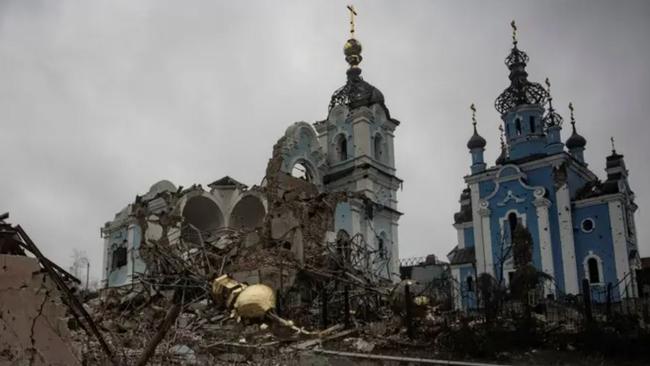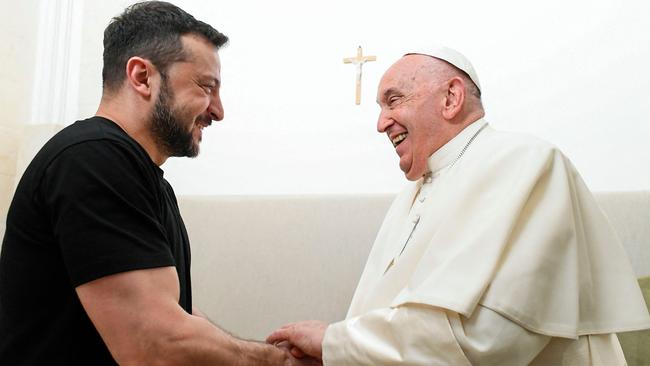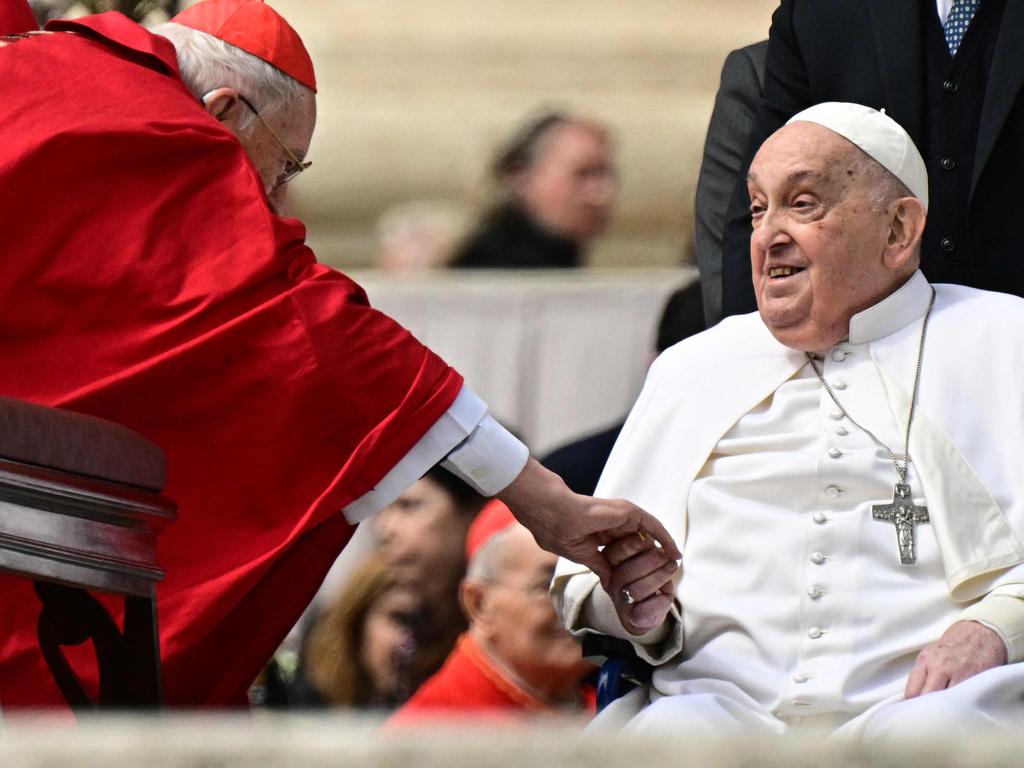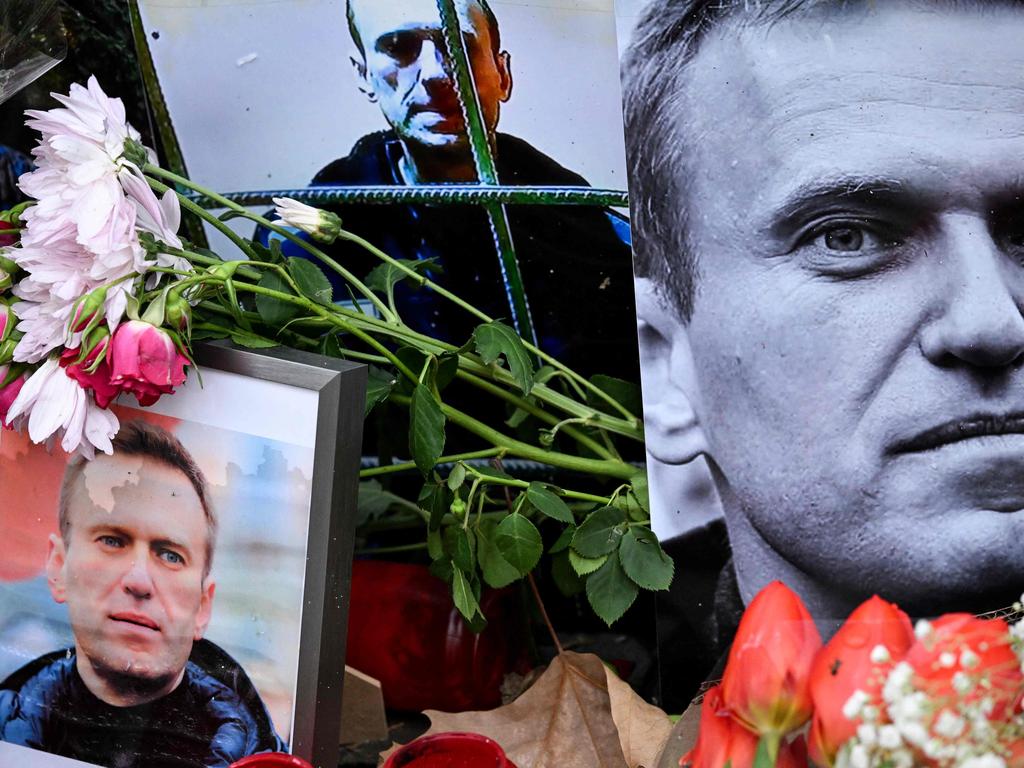
We were somewhere in Ukraine’s Donetsk region but not quite sure where. Nor did we know if the path our navigator had led us down was a road to nowhere. What was clear was the regular beat of artillery fire nearby and the rising fury of our security adviser.
It was October 2023 and our film crew had come close to the frontline of a war in search of the Bushmasters the Australian government had donated to the cause of defending Ukraine. We had arranged to meet combat medic Hannah Hurava, who daily drove into harm’s way to tend to the wounded and dying. Her husband was a driver.
By the time we found the village, and Hurava, it was dark and everyone was keen to tape the interview and go. Setting up lights in the open was out of the question, so we all piled into the back of a blood-stained, Bendigo-made troop transport that doubled as a field ambulance. But no amount of armour could shield Hurava from the rote horror of her job.
“You must see some terrible things,” I said. “Tak,” she said, nodding. Yes. Hurava had the distant gaze of trauma in her eyes as she spoke through a translator. At the end I asked what she hoped for.
“My husband and I have been married for a long time and we never thought about having children,” Hurava said. “Now, after what I’ve seen in the war, I’ve been thinking about making sure the family survives. About the value of life. And the need to ensure there is another life after me.”

Here, perched on the edge of hell, was a fragile light. In the killing fields at least one person’s thoughts turned to bearing life. To defying death. Here was evidence of the truth Viktor Frankl discovered in a German concentration camp. “Everything can be taken from a man but one thing: the last of the human freedoms, to choose one’s attitude in any given set of circumstances, to choose one’s own way,” he wrote in Man’s Search for Meaning.
Hope is the stubborn genius of humanity. It’s what remains when all else is stripped away. As Frankl knew, it can be surrendered but never taken. In the Christian tradition, Easter is the incarnation of that hope, in the witness of the life, death and resurrection of Jesus Christ. Although it’s now largely invisible to most, that old faith touches everyone who lives in a Western democracy.
Our ideals – the belief in equality, dignity and compassion – are the fruit of a tree whose roots lie deep in Christianity. As Tom Holland explores in his book Dominion: The Making of the Western Mind, humanism derives ultimately from claims made in the Bible – that humans are fashioned in God’s image; that his son died equally for everyone; that there is neither Jew nor Greek, slave nor free, male nor female, for all are one in Christ.

From the beginning, the Christian God is a God of justice and a God of reason. This rings loudly from the pages of the New Testament. It is explicit in the opening of John’s Gospel, itself an echo of the first sentence of Genesis. “In the beginning was the word,” John says. The New Testament was written in Greek and the Greek for word is logos, which also means reason. So, in the Christian tradition, God is reason itself.
Christianity unites Greek philosophy with Jewish mysticism. It is the marriage of reason and faith. What’s born is a radically new theology that would redefine human behaviour. Not to act in accordance with reason is contrary to the nature of God – but it is reason tempered by faith. It demands we “love one another” and “do unto others that which you would have them do unto you”.
This is not the narrow modern definition of reason that reduces everything to that which can be measured. It is Augustine’s famous motto: faith seeks understanding. Faith is not opposed to reason, it longs for deeper knowledge. Let’s call it wisdom.
Although Christianity is born in the East, it’s informed by the West and takes on its historically decisive character in Europe. Europe is defined by its faith and its faith is defined by reason.
Reason drives Europe on the road to liberal democracy. Through all its failures and its many crimes, reason pushes this society forward and demands that it learn, evolve and progress in tandem with the light of its faith.
That light burned bright when the torch passed from England to the US. Thomas Jefferson married faith and reason when he wrote: “We hold these truths to be self-evident that all men are created equal, that they are endowed by their Creator with certain unalienable Rights, that among these are Life, Liberty and the pursuit of Happiness.”
Slavery cast a great shadow over these words. Jefferson was a slave owner, but the truth in what he wrote could not be denied. Before the ink was dry on the Declaration of Independence some attacked what they called its “glittering generalities” and predicted that one day Jefferson’s words would tear the union apart. Because the only rational conclusion from reading the unassailable Christian truth at the heart of Jefferson’s words was that it demanded the slave be set free.
Less than a century later that reckoning would come with the civil war.

No one better articulated the stain of slavery or the price that would be exacted to scrub it from the nation than Abraham Lincoln in his second inaugural address: “Fondly do we hope – fervently do we pray – that this mighty scourge of war may speedily pass away. Yet, if God wills that it continue, until all the wealth piled by the bondman’s two hundred and fifty years of unrequited toil shall be sunk, and until every drop of blood drawn with the lash, shall be paid by another drawn with the sword, as was said three thousand years ago, so still it must be said ‘the judgments of the Lord are true and righteous altogether’.”
Jefferson and Lincoln appeal to their faith and to reason when they define the values of their nation.
And 100 years after Lincoln signed the Emancipation Proclamation a Christian preacher would lead a quarter of a million people on a march on Washington to, in his words, “cash the cheque” that the architects of the republic wrote into the Declaration of Independence.
Martin Luther King said it was a promissory note that had not been honoured. But he had a dream “that one day this nation will rise up and live out the true meaning of its creed”.
What King wanted was what the arc of the Western liberal tradition demanded: equality. Not a special place in a democracy but the rightful place promised to every citizen.
King knew the logic of his words could not be denied, and his faith demanded justice. He was not seeking to demolish the Western liberal tradition – he just wanted his society to be as good as its word. To not default on its heritage. To be reborn and redeemed.

It is Easter, a time of hope and redemption. And hope is not optimism. It is not naive. It does not deny suffering or sidestep injustice. It endures despite them. It survives the cross. It survives the camps. It survives the battlefield.
That night in Donetsk, Hurava told us she had begun to think about children. About planting life in the middle of death. That, in its essence, is Easter.
Because at the heart of Christianity – the wellspring of our democratic tradition – is a radical, unbelievable hope. That life has a meaning that defies even death.
We live in a time when faith is ridiculed, history is rewritten and the foundations of democracy are dismissed – sometimes by those charged with leading us. But as Frankl saw, and as the gospels insist, some truths cannot be killed.
They can be crucified. But they will rise.






